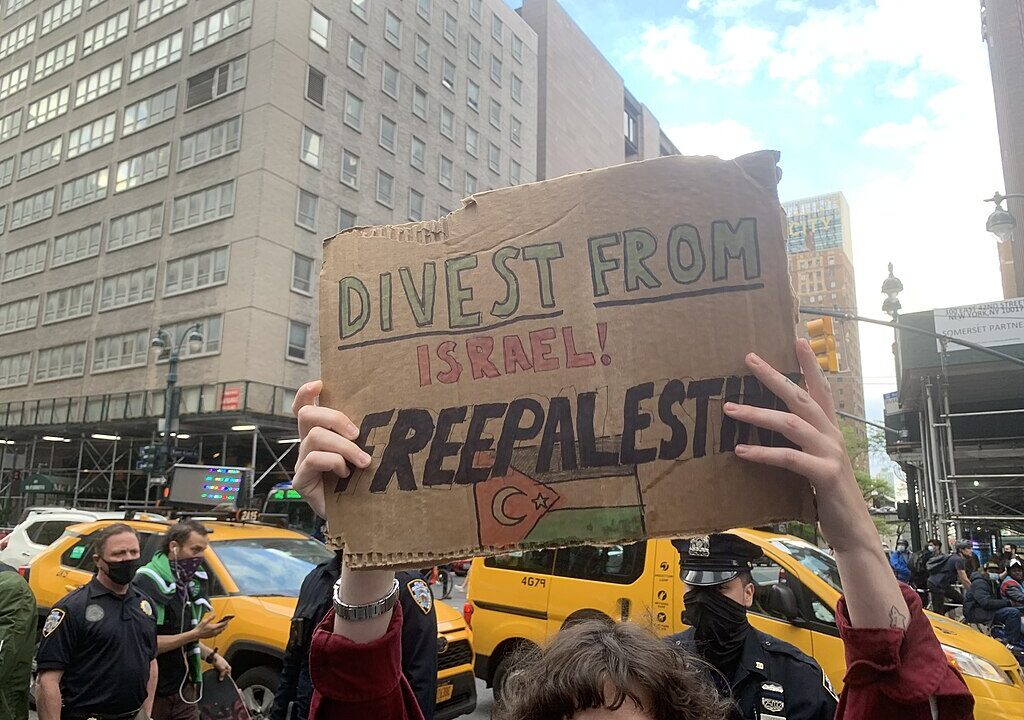We are now more than six months into Israel’s unfolding genocide against Palestinians in Gaza. Horrifying footage from the ground in Al-Shifa Hospital will haunt us for decades to come. Hollow echoes of “Never Again” have lost all meaning as we watch live the evisceration of Palestinian men, women, and children. Joe Biden’s administration has the power to end Israel’s ethnic cleansing of Palestine. Instead, the Biden administration has fueled and funded it.
There is a direct and effective way to end Israel’s ability to reproduce its genocidal project, the project of Zionism: BDS, the movement to boycott, divest from, and sanction Israel. BDS is a Palestinian-led, international movement to end apartheid in Israel by isolating the Israeli state from its institutional, governmental, and corporate backers.
Inspired by the decades of boycotts and sanctions against apartheid South Africa, BDS was launched in 2005 by Palestinian civil society organizations with one clear message: Palestinians deserve dignity and justice—without qualification. This means ending affiliation or collaboration with any institution that has ties to Israel’s systematic oppression and subjugation of Palestinians, from the river to the sea and beyond. Since 2005, the BDS movement has won the support of thousands of unions, churches, cultural and academic institutions, associations, and other organizations that are collectively refusing to normalize ties with Israeli apartheid and occupation. BDS underscores a simple fact: there is absolutely nothing normal about land theft, identity erasure, and apartheid.
For over two decades, and long before there were any openings in Congress around meaningful Palestine legislation (i.e., before “the Squad” entered the scene), BDS—in collaboration with groups like Students for Justice in Palestine, who took up the boycott-and-divestment call and put it into action—laid the infrastructure for the persistent network of actions, protests, and campaigns that have spread across the United States since October 7, 2023.
The boycott call consists of cultural, academic, product, and sports boycotts. In other words, BDS makes it clear that you cannot separate arts, culture, sports, and academia from politics. Crucially, the boycott is not of Israelis as individuals but of their connections to Israeli state institutions, whether they be academic or cultural. In fact, from World War II to Vietnam, history has taught us that there is no realm of life that is not infused with politics. Neutrality is an illusion in the face of crimes against humanity. To be neutral is to be complicit.
There are dozens of Israel boycott campaigns spread across various industries. Take, for example, the global campaign against major athletic retailer Puma, which sponsors the Israeli national football team and operates from illegal Israeli settlements built on Palestinian land. Two hundred Palestinian sports clubs issued a call demanding that Puma end its partnership with Israel. Just last year, the campaign was victorious after years of pressure from consumer boycotts hit the brand hard, leading to the company officially declaring it would end its relationship with the Israeli national team. Other examples of boycott campaigns under BDS are consumer boycotts of products from companies profiting off the oppression of Palestinians. BDS has a substantive list of products to boycott, and it includes things you’ll find in your local grocery store (boycott Sabra hummus!) or when you’re browsing potential laptops for school or work (boycott HP!)
The call for divestment is aimed at governments, unions, and corporations whose bilateral aid, pension funds, and investment portfolios are implicated in reproducing Israel’s settler-colonial project—and, in the case of Gaza specifically, in the genocide that is taking hundreds of lives each day and scarring humanity for generations. Divestment campaigns pressure targets to terminate contracts with Israeli companies, end investments in weapons manufacturers that are building bombs for Israel, and stop investing in Israeli state bonds, which many union pensions are tied to. Divestment campaigns are a call for money to be divested from military spending and instead invested in life-giving campaigns and initiatives.
Divestment can also look like local and state governing bodies, like city councils and state assemblies, refusing to give tax breaks to organizations masquerading as charities in order to raise millions of dollars in funding for the expansion of illegal, Jewish-only settlements built on Palestinian land. In 2023, the Not on Our Dime Act was introduced in the New York State legislature to put an end to subsidized cash flows of money to entrench Israeli apartheid. And back in January, Hayward City Council in California voted to divest from four companies complicit in Israeli violations of human rights and international law.
Sanctions are perhaps the most important clause within BDS, because they carry the power to financially and politically isolate Israeli apartheid, a move that would have global reverberations. Sanctions were a divisive tool in the struggle to put an end to apartheid in South Africa. In the United States, the first step toward sanctions is pressuring the US government to end all US funding to Israel. At the time this article was written, France was the only country considering a full arms embargo and sanctions for Israel. Across the United States, at least 130 local and state institutions have passed ceasefire resolutions with clauses calling for investigating city funds invested in Israel.
Palestinians have used boycotts as a tool of struggle against Israel’s repeated ethnic cleansing campaigns, from 1948 to the present. In fact, between 1948 and 1994, Arab boycotts of Israel resulted in $40 billion in losses for Israel. The implementation of the 1993 Oslo Peace Accords—a glaring misnomer—ended the boycott campaigns and further expanded Israel’s land theft into the occupied West Bank and Gaza.
The importance of BDS also lies in its ability to draw clear symbolic and, critically, material connections between Israel’s settler-colonial project and a plethora of right-wing state projects globally, by exposing the role of corporations in sustaining oppressive regimes. One example worth mentioning is the Israeli defense contractor Elbit Systems. Elbit operates hundreds of Israeli security checkpoints, entrapping Palestinians in Bantustan-like conditions. The same company is responsible for the hyper-militarization of the US-Mexico border. More broadly, Israel is the world’s largest arms supplier per capita and one of the leading states in producing new military technology. This technology is often tested on Palestinians before being exported to state governments around the world, who in turn use it to surveil, imprison, and repress their domestic populations. In fact, during the last six months of Israel’s onslaught in Gaza, Israel has seen its arms industry exports soar as it tests new weapons on Palestinians in Gaza.
The urgency of adopting BDS in schools, churches, unions, sports and academic associations, and governments has always been high. But now, as Israel lays bare to the rest of the world the depth of its depravity and the integral violence that underpins Zionism, it is imperative for every single person in the United States to join existing BDS campaigns in their area or begin to chart a course for launching a BDS campaign in their school, their church, their workplace, or even their local grocery store. The United Auto Workers (UAW) followed their permanent ceasefire resolution with a commitment to investigate union funds invested in Israel, making it clear that unions have a responsibility to take a stand against genocide and war. The end of Israel’s reign of terror is near. What will you answer when future generations ask, “What did you do to stop the genocide of Palestinians?”

